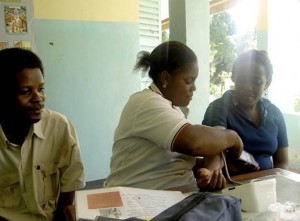
Problem being addressed[edit | edit source]
Women in resource-limited settings are seven times more likely to develop pre-eclampsia than women in developed countries. Regular blood pressure (BP) monitoring is a cost-effective means of identifying such hypertensive diseases in their early stages. However, medical facilities in resource-limited settings lack the ability to take accurate BP measurements.
Detailed description of the solution[edit | edit source]
CRADLE is a cheap, automated blood pressure monitor that is a feasible and sustainable solution to accurately measure blood pressure in rural antenatal clinics. The device generates reliable results and requires minimal training, and also features a prolonged battery life. In addition, the device has been proven to yield high levels of user satisfaction and good durability.
Designed by[edit | edit source]
- Designed by: Andrew Shennan, professor of Obstetrics at Kings College London
When and where it was tested/implemented[edit | edit source]
Ethiopia, Tanzania, and Zimbabwe
Funding Source[edit | edit source]
Grand Challenges Fund awarded by Bill and Melinda Gates Foundation Maternity Worldwide Tommy's
References[edit | edit source]
Peer-reviewed publication[edit | edit source]
Baker, E. C., Hezelgrave, N., Magesa, S. M., Edmonds, S., de Greeff, A., & Shennan, A. (2012). Introduction of automated blood pressure devices intended for a low resource setting in rural tanzania. Tropical Doctor,42(2), 101-103. doi:10.1258/td.2011.110352; 10.1258/td.2011.110352
Externally generated reports[edit | edit source]
Community blood pressure monitoring for pregnancy hypertension in rural Africa: the CRADLE (formerly COBRA) project. (2012, December). Retrieved from here
Community blood pressure monitoring in rural Africa: Detection of underlying pre-eclampsia (CRADLE). (n.d.). Retrieved from here
Community BP monitoring to detect pre-eclampsia in Africa. (2010, November). Retrieved from here